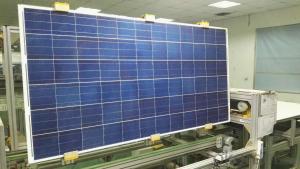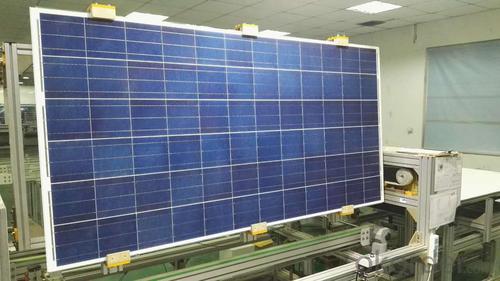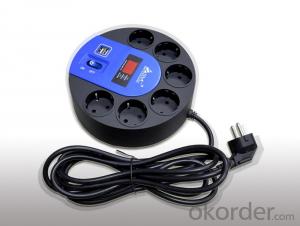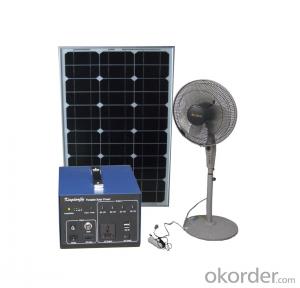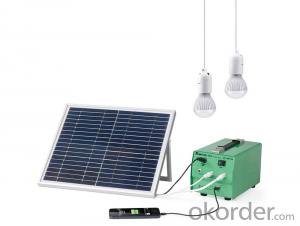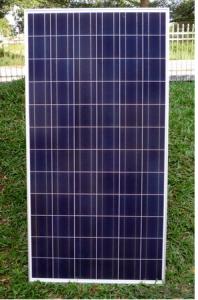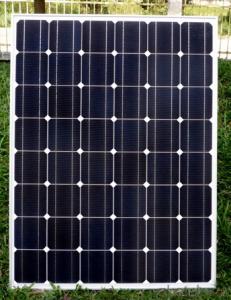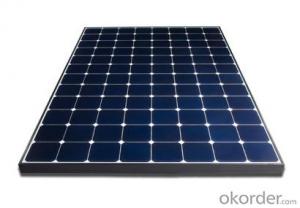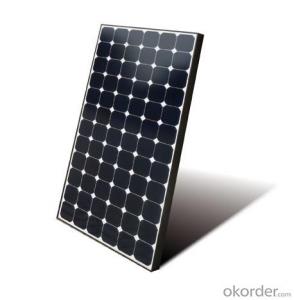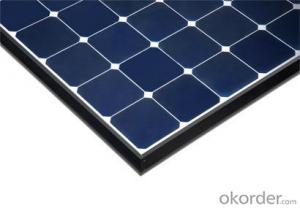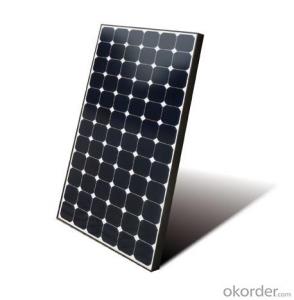Florida Solar Energy Systems - CNBM Poly 50W Off Grid Solar System with 10 Years Warranty
- Loading Port:
- China main port
- Payment Terms:
- TT OR LC
- Min Order Qty:
- 5 watt
- Supply Capability:
- 1000 watt/month
OKorder Service Pledge
OKorder Financial Service
You Might Also Like
Specification
CNBM Poly 50W Off Grid Solar Sytem with 10 Years Warranty
Product description
Off-the-grid is a system and lifestyle[1] designed to help people function without the support of remote infrastructure, such as anelectrical grid. In electricity, off-grid can be stand-alone power system or mini-grids typically to provide a smaller community with electricity. Off-grid electrification is an approach to access electricity used in countries and areas with little access to electricity, due to scattered or distant population. The term off-the-grid (OTG) can refer to living in a self-sufficient manner without reliance on one or more public utilities. People who adopt this lifestyle are called off-gridders.[2]
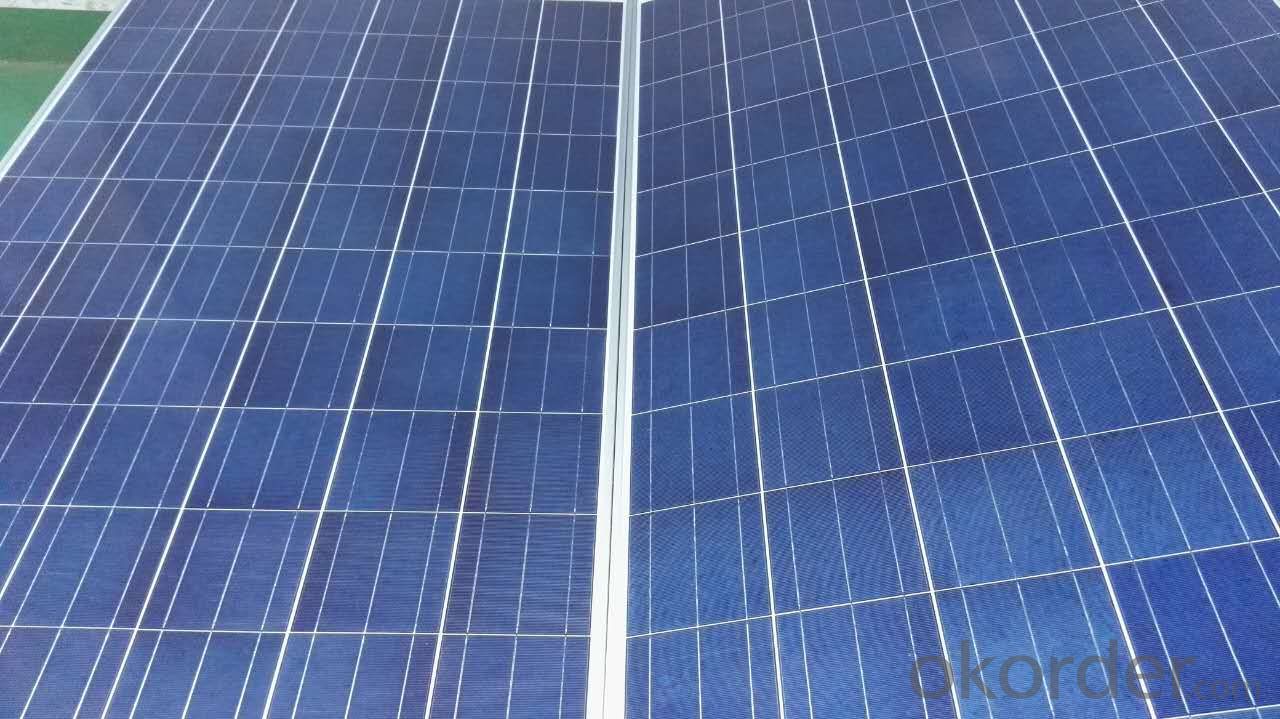
Application
Residential
Commercial
Industrial
Feature
Off-the-grid homes are autonomous; they do not rely on municipal water supply, sewer, natural gas, electrical power grid, or similar utility services. A true off-grid house is able to operate completely independently of all traditional public utility services. The idea has been recently popularized by certain celebrities including Ed Begley, Jr.[3] who stars in the Living with Ed[4] television show on the Home & Garden Television (HGTV) network. Actress Daryl Hannah promotes off-grid living and constructed her home in Colorado according to those principles, as does survival expert and Dual Survival co-star Cody Lundin,[5] who lives in a self-designed, passive solar earth house in the high-desert wilderness of Northern Arizona, collecting rainwater, composting waste, and paying nothing for utilities.[6][7]
Packaging
With carton and box
- Q: How do solar energy systems contribute to reducing peak demand on the electrical grid?
- Solar energy systems contribute to reducing peak demand on the electrical grid by generating electricity during the day when demand is highest. This reduces the need for additional power from traditional sources during peak hours, which helps to stabilize the grid and prevent potential blackouts. Additionally, solar energy systems can also feed excess generated electricity back into the grid, further alleviating peak demand and reducing strain on the electrical infrastructure.
- Q: What is the difference between solar energy systems and solar panels?
- Solar energy systems and solar panels are interconnected yet distinct entities. The primary constituents of a solar energy system are solar panels. These devices convert sunlight into electricity by utilizing photovoltaic cells. The cells consist of semiconductor materials that generate an electric current upon exposure to sunlight. Multiple solar cells are typically connected to form solar panels, thereby increasing voltage and power output. These panels are often installed on rooftops or in open areas to maximize sunlight absorption. In contrast, a solar energy system comprises more than solely solar panels. It encompasses all the essential components and equipment necessary to effectively harness and utilize solar energy. This includes inverters, which convert the direct current (DC) electricity generated by the solar panels into alternating current (AC) electricity suitable for residential or commercial use. Other components may incorporate batteries for energy storage, charge controllers to regulate electricity flow, and monitoring systems to track the solar energy system's performance. To summarize, solar panels are physical devices that capture sunlight and convert it into electricity, while a solar energy system is a comprehensive setup that integrates solar panels with other vital components to efficiently generate, store, and utilize solar energy.
- Q: Can solar energy systems be used for powering breweries?
- Yes, solar energy systems can be used for powering breweries. Solar panels can generate electricity that can be used to power various equipment and processes in breweries, including heating water, running pumps, and powering lights. Implementing solar energy systems can help breweries reduce their environmental impact, lower their energy costs, and promote sustainability.
- Q: Can solar energy systems be used for electric vehicle charging?
- Yes, solar energy systems can be used for electric vehicle charging. Solar panels can generate electricity which can be stored in batteries and used to charge electric vehicles. This provides a sustainable and renewable source of energy for EV charging, reducing reliance on fossil fuels and lowering carbon emissions.
- Q: How does the efficiency of solar panels vary across different manufacturers?
- The efficiency of solar panels can vary across different manufacturers due to several factors, including the quality of materials used, the manufacturing process, and the level of research and development invested in improving efficiency. Some manufacturers may have more advanced technologies or use higher-quality materials, resulting in higher efficiencies. Additionally, different manufacturers may prioritize different aspects of solar panel production, such as cost-effectiveness or durability, which can also impact efficiency. Therefore, it is important to compare the efficiency ratings and performance warranties of different manufacturers when considering solar panel options.
- Q: Can solar energy systems be used in areas with limited access to information technology?
- Yes, solar energy systems can be used in areas with limited access to information technology. Solar energy systems primarily function using photovoltaic cells that convert sunlight into electricity, which does not require frequent monitoring or maintenance. These systems can be installed and operated without the need for complex information technology infrastructure. Therefore, even in remote or underdeveloped areas with limited access to information technology, solar energy systems can still be effectively utilized to provide sustainable and reliable power.
- Q: Can a solar energy system be installed on a ground-mounted structure?
- Yes, a solar energy system can be installed on a ground-mounted structure. Ground-mounted solar systems are a popular option for residential, commercial, and utility-scale installations. These systems involve placing solar panels on a structure that is built on the ground, such as a pole, rack, or frame. Ground-mounted systems have several advantages, including flexibility in panel placement, easier maintenance and cleaning, and the ability to optimize the angle and orientation of the panels for maximum energy production. Additionally, ground-mounted systems can be installed in areas where rooftop installation is not feasible, such as properties with limited roof space or shading issues. Therefore, installing a solar energy system on a ground-mounted structure provides an effective and efficient way to harness solar power.
- Q: Can a solar energy system be installed on a parking garage or structure?
- Yes, a solar energy system can definitely be installed on a parking garage or structure. In fact, parking garages and structures are often ideal locations for solar installations due to their large surface areas and access to sunlight. Solar panels can be mounted on the roof or exterior walls of parking structures, maximizing the utilization of available space. Additionally, the elevated position of parking garages allows for better exposure to sunlight, resulting in more efficient solar energy generation. Moreover, installing a solar energy system on a parking garage or structure can provide multiple benefits, such as generating clean and renewable energy, reducing electricity costs, and offsetting carbon emissions. This makes it a sustainable and environmentally-friendly choice for energy production.
- Q: What is the lifespan of solar cells used in solar energy systems?
- The lifespan of solar cells used in solar energy systems can vary, but on average, they can last anywhere from 25 to 30 years.
- Q: Can solar energy systems be used for powering disaster relief operations?
- Yes, solar energy systems can be used for powering disaster relief operations. In fact, they have proven to be extremely valuable in providing electricity in areas affected by natural disasters. Solar energy systems, such as solar panels and solar-powered generators, can be quickly deployed to disaster-stricken regions, providing a reliable and sustainable source of electricity. One of the main advantages of solar energy systems is their ability to operate independently of the grid. This is particularly beneficial in disaster situations where the power infrastructure may be damaged or completely destroyed. Solar panels can generate electricity even in remote areas, allowing relief workers to access power for essential operations, such as communication, medical services, lighting, and water purification. Solar energy systems are also cost-effective and environmentally friendly. Once installed, solar panels require minimal maintenance, and the sunlight is a free and abundant source of energy. This eliminates the need for fuel deliveries or expensive diesel generators, which can be logistically challenging and costly in disaster-affected areas. Moreover, solar power does not produce harmful emissions, reducing the impact on the environment and improving air quality in already vulnerable regions. Additionally, solar energy systems can be easily scaled up to meet the increasing power demands of disaster relief operations. Temporary solar arrays can be set up quickly, and if needed, additional panels can be added to the system to provide more electricity. This flexibility allows relief organizations to adapt and respond to the changing needs of the affected population. However, it is important to note that solar energy systems may have limitations. They are dependent on sunlight availability, which can be affected by weather conditions or geographical factors. In regions with limited sunlight or during cloudy periods, the system's output may be reduced. To overcome this challenge, energy storage solutions, such as batteries, can be integrated into the system to store excess energy for use during low sunlight periods. In conclusion, solar energy systems have proven to be a reliable, cost-effective, and sustainable solution for powering disaster relief operations. They provide electricity independently of the grid, mitigate environmental impact, and can be easily scaled up. By utilizing solar power, relief organizations can efficiently deliver essential services to those in need and contribute to a swift recovery process in disaster-affected areas.
Send your message to us
Florida Solar Energy Systems - CNBM Poly 50W Off Grid Solar System with 10 Years Warranty
- Loading Port:
- China main port
- Payment Terms:
- TT OR LC
- Min Order Qty:
- 5 watt
- Supply Capability:
- 1000 watt/month
OKorder Service Pledge
OKorder Financial Service
Similar products
Hot products
Hot Searches
Related keywords
